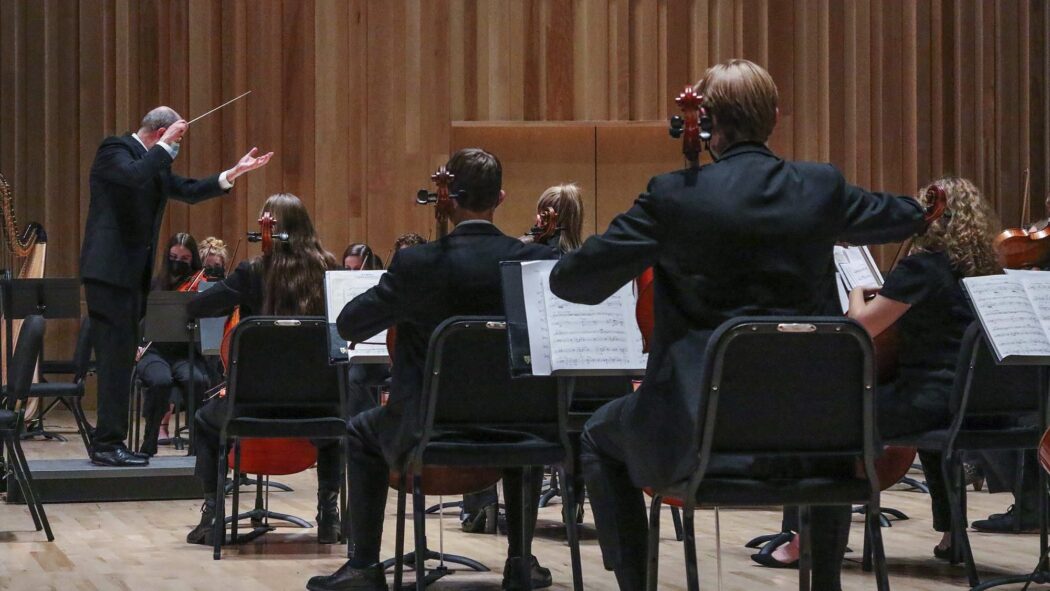USU Orchestra: COVID-19 feelings expressed through music
On Dec. 7 in the Daines Concert Hall, the Utah State University Symphony Orchestra performed “The Sound of Talking,” a symphony interpreting the feelings of students during the coronavirus outbreak.
The concert was orchestrated to celebrate music composed by American women and featured works from three composers who had an especially memorable message.
One of those composers was Florence Price, who was the first African American woman to have a piece performed by a major symphony orchestra.
Sergio Bernal, the director of the USU Symphony Orchestra, called Price a pioneer in composition who led the way for future women pursuing composition.
The orchestra performed “Leyendas,” a piece by a well-known modern composer Gabriela Lena Frank, which was inspired by folk and popular music from Peru. The music invokes legendary situations and feelings that are very powerful, fitting right in with the ambiance of the concert.
Bernal also had the idea to compose a piece about the emotional impact coronavirus had on students.
“It’s a very specific topic and — of course — one that is very relevant nowadays and very relevant to us because we are a university. I thought it would be interesting to portray what students are feeling in these troubling times,” Bernal said.
He turned to Emma Cardon to write the music. Cardon grew up in Cache Valley and was part of the USU Youth Conservatory during high school. She is a recent graduate from Vanderbilt University and is pursuing a graduate degree in music composition at the Cleveland Institute of Music.
Although, her career in music composition started long before her college career. She submitted her first piece into a competition when she was six years old.
“She took the challenge and I think she wrote a masterpiece,” Bernal said.
Cardon started this piece in the summer and had interviewed students from USU and Vanderbilt. She had the students fill out interview sheets and composed the lyrics from their responses.
“One of the questions was, ‘What are the things that you miss most?’” Cardon said. “I asked people to give adjectives of how they felt at the beginning and the end of the pandemic so you can sort of see the shift in people’s emotional state. And I asked the students to write a short poem describing how they feel.”
The piece is split into five movements, each movement expressing different emotions felt during the pandemic.
“That takes the music from — for the most part — the own words of the students,” Bernal said. “And she organized them in a way that gave a very powerful message and wrote exceptionally good music to go with those texts.”
The first movement, I Miss, expressed the parts of life students missed the most in the pandemic and what they wanted back.
“They missed the sound of talking,” Cardon said.
The next movement, I Feel, illustrated the adjectives the students listed about how they felt during the pandemic.
The third movement, Breath, has lyrics drawn from a poem written by a student.
“One year ago, they told me to hold my breath for 10 seconds,” the student wrote. “I’ve been waiting here under the surface.”
This movement is very introspective and grieving, written in a tone and beautiful style, as described by Cardon.
The fourth movement, The Silver Lining, is about how we all received something positive for ourselves during the pandemic. The song expressed how it’s easy to feel guilty to have benefited from the pandemic while other people were hurt.
The final movement was about hope for the future, leaving the concert on an optimistic note.
Malia Mabray, a junior at USU who attended the concert, said there was a lot to love about it. “I really liked the instrumentals of the five sections. I think the words were really inspiring and accurate to what everybody was feeling during the pandemic.”
Thomas Glenn was the performing tenor at the concert and said Cardon’s piece had moments of unique beauty.
One lyric from The Silver Lining movement stood out to Glenn the most: “Everyone seemed to pull together, though we were apart.”
“The implications of this phrase are obvious,” Glenn said. “It encourages connection despite the separations in our current state. Even though we are physically distanced much of the time, we can still create meaning in each other’s lives through new and creative means.”
Counselors from the USU Counseling and Psychological Services, or CAPS, gave a brief address to the audience about the resources available for students that are struggling mentally and emotionally from the pandemic. These resources can be found at https://www.usu.edu/aggiewellness/mental-health.
-Brielle.Carr@usu.edu

